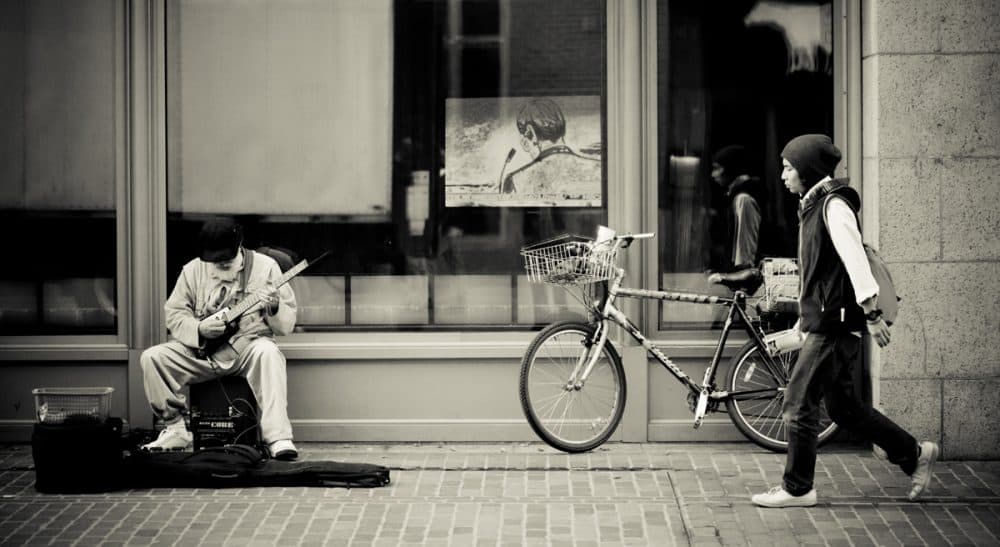Advertisement
Regulars: The Casual Encounters That Shape Our Days

This holiday season, we had a good run of visits with dear old friends, with the geographically scattered people who have known and loved us through changes in size, hair line and color, career, home, even (occasionally) politics. Each get-together with my old college roommate or high school hitchhiking companion, with my husband’s Junior High friend or his longstanding music buddy, has felt as warm and comfortable as our winter quilt.
But today I’m thinking about the people who populate the other days, the ordinary days of commuting to work, buying groceries, or working out at the gym.
For a time a black man in a white shirt buttoned all the way up to his neck played tenor saxophone in the Porter Square subway station during the morning rush hour. His tone wasn’t great, nor was his speed, but he played with an endearing seriousness and lyricism. For the first few weeks he was there, I’d simply drop a dollar in his sax case, murmur my thanks, and then keep walking to my preferred spot at the far end of the platform. But he recognized me as a jazz fan, and was even more eager to discuss music when he learned that I was an aspiring sax player. He would lower his horn when he saw me coming, and we’d talk, agreeing that Victor Young wrote beautiful, timeless tunes; racking our brains for the name of the guy who composed “The Autumn Leaves,” debating the merits of John Coltrane versus Sonny Rollins. Sometimes I’d press him for trade secrets. Were particular T stops or times of day more lucrative than others? Did certain songs more reliably fill his case with change? But this soft-spoken man was careful and vague in his answers, unwilling to complain or judge.
I haven’t seen him lately; he told me he might get an early gig at Park Street station. The lean man who has replaced him for the morning commute has a shock of hair that drops over his eyes, and he plays guitar like José Feliciano, weaving intricate and fiery runs out of Beatles songs. He’s a joy to listen to, but he rarely looks up and is not a talker.
I find a different kind of ease ... with the men and women who don’t know my name, let alone anything about me.
Now Butch, the guy who used to sell Spare Change on Brattle Street — he was a talker.
“Where are you from?” he asked me one April day when I bought a paper from him.
“Cambridge.”
“No, girl,” he answered with a hint of impatience. “I mean where are your people from?”
“Canada, Russia…” Then the light dawned. “I’m Jewish.”
He beamed. “See, that explains why you look like me.” Gazing at his russet face and stubbly razor burn, I didn’t see the resemblance. “Your people and mine, we came from the same place back about 5,000 years ago,” he explained. So began a short lecture that combined little-known “facts” from the Old Testament, a chronicle of the migratory patterns of early Homo sapiens, and a lament about the once strong and now-faltering alliance between blacks and Jews in the civil rights movement.
“Hey, Jewish Girl,” he’d call out when he saw me approaching from Story Street, and for what must have been a couple of years, we’d chat at least once a week when I bought a paper from him. One day a pedestrian muttered “Get a job” as he passed Butch by. “I’ve got a job,” he retorted. “I’m in Sales.” His energy was contagious, better than coffee.
The locker room companions from my water aerobics class lend my life the same sort of comforting constancy. For years, I’ve been one of a cadre of women wriggling bathing suits over and down our increasingly rounded bellies and dimpled thighs every Tuesday and Thursday night, blasting the chlorine off our skin, rubbing the oil back into our hair. We talk about the weather or some new move that our instructor has introduced. From these women I’ve learned obscure details about the library cataloging systems and knee surgery, about kidney infections in cats and vinaigrette recipes. I still don’t know all of their names, might not even recognize them fully clothed in an office or a restaurant. But I don’t need to. In fact, I don’t even want to. The kind of trust that enables us to reveal our sags, folds, and puckers might not survive outside the changing room.
I’m happy and serene among old friends who have known each other so long and so well. We’ve made a garden of our lives, each tending a precious part of the whole. But I find a different kind of ease in the daily touch points with the men and women who don’t know my name, let alone anything about me. They are the people with whom I can chat with anonymous comfort, if not consequence. Like the stops on the red line or the numbers on the banks of beige lockers, they orient me, lending human form and structure to each of my days. And for that, this Jewish girl is grateful.
